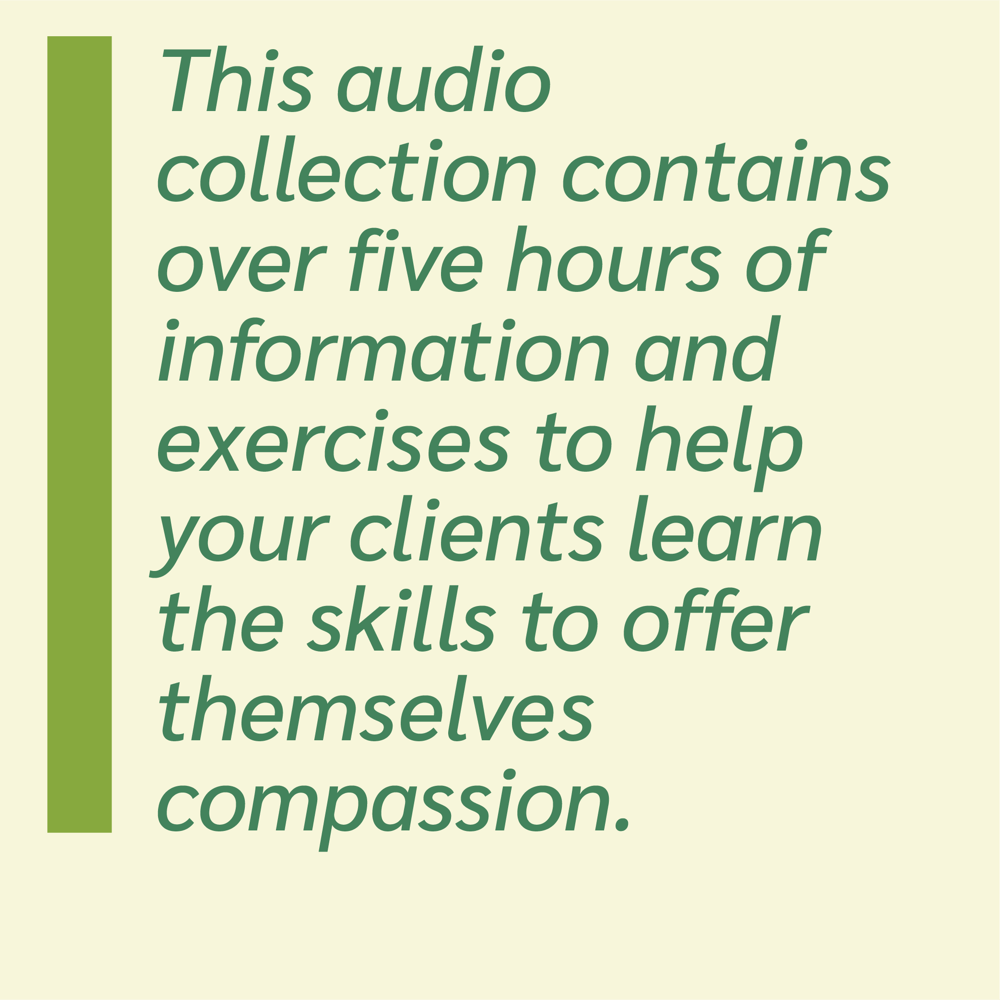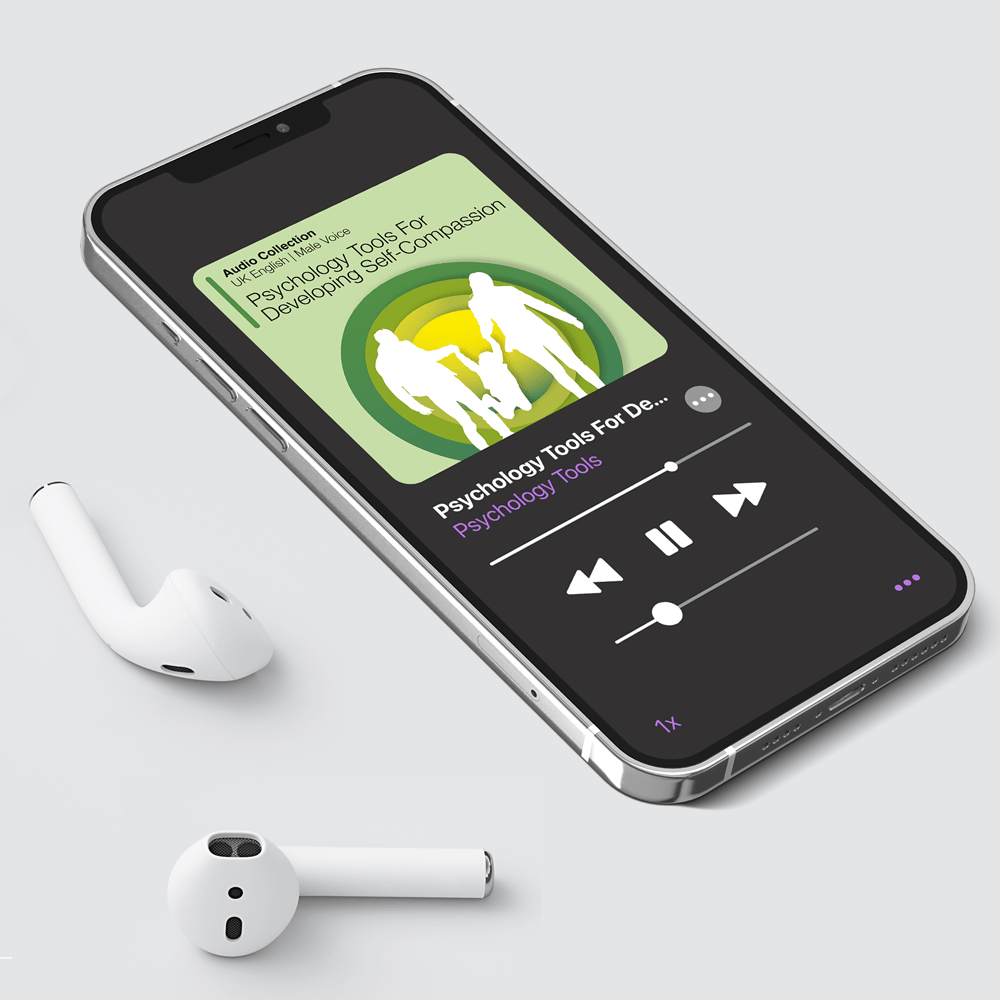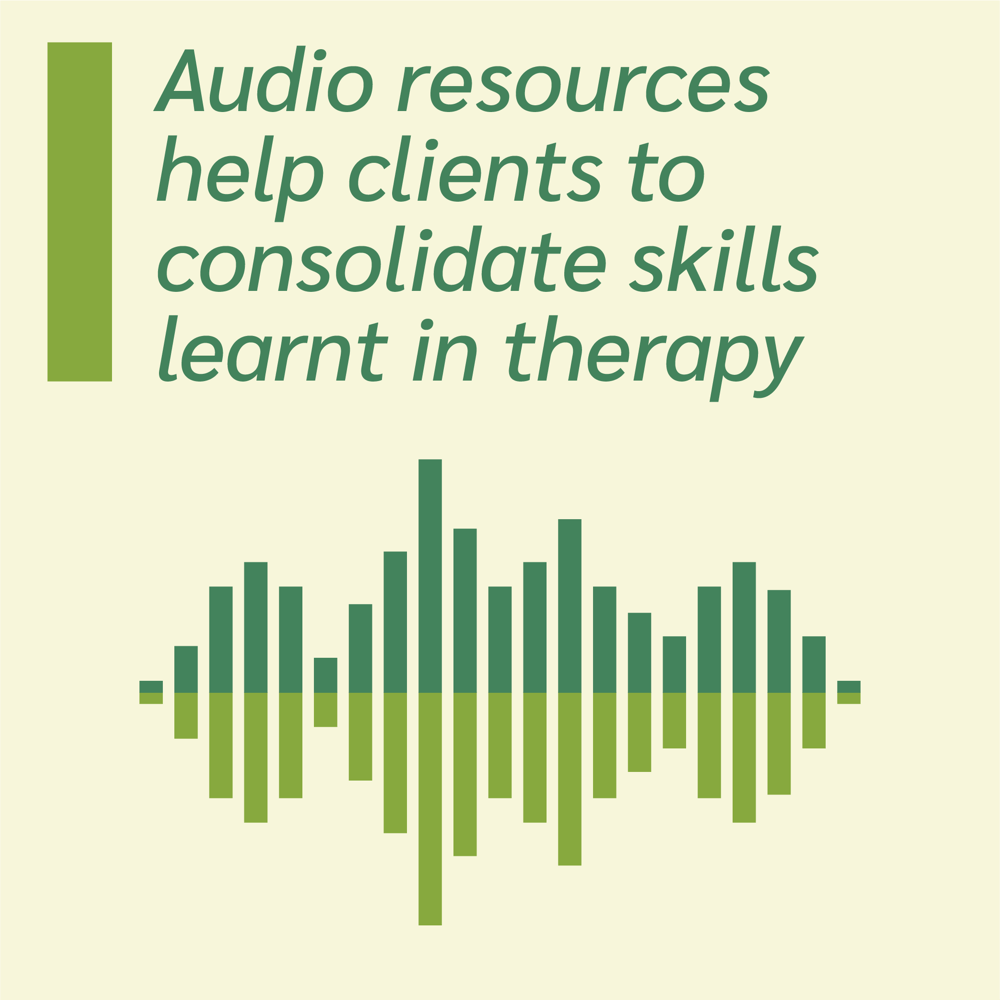Audio Collection: Psychology Tools For Developing Self-Compassion
Psychology Tools For Developing Self-Compassion is an audio collection which guides clients through an empirically-supported programme of compassionate mind training (CMT). This skills-development program is designed for those who struggle with self-criticism, shame, self-esteem, or any other consequences of living with a tricky brain. CMT has been demonstrated to increase how much compassion an individual has for themselves and for others, which can not only reduce psychological distress but also increase wellbeing. Developed with Dr Chris Irons, one of the main international trainers of Compassion Focused Therapy (CFT), the audio collection contains over five hours of exercises that your clients can practice to develop their self-compassionate motivation.
Download or send

Choose your language
Audio Collection (ZIP)
Premium Feature
Listening and Practice Record
Premium Feature
Audio script (PDF)
Premium Feature
1. About this audio collection (MP3)
Premium Feature
2. What is compassion, why do I need it, and how might it help me? (MP3)
Premium Feature
3. Living with a tricky brain (MP3)
Premium Feature
4. The three systems (MP3)
Premium Feature
5. Attention and mindfulness: the foundations of compassion (MP3)
Premium Feature
6. The spotlight exercise (MP3)
Premium Feature
7. Mindfulness of sounds and thoughts (MP3)
Premium Feature
8. Mindfulness of body (MP3)
Premium Feature
9. Mindfulness of breathing (MP3)
Premium Feature
10. Mindful walking (MP3)
Premium Feature
11. Developing your soothing system (MP3)
Premium Feature
12. Body posture (MP3)
Premium Feature
13. Facial expression (MP3)
Premium Feature
14. Voice tone (MP3)
Premium Feature
15. Breathing to activate your soothing system (MP3)
Premium Feature
16. Combining soothing breathing with a soothing smell (MP3)
Premium Feature
17. The power of imagery and memory (MP3)
Premium Feature
18. CFT calm place (MP3)
Premium Feature
19. A memory of feeling cared for (MP3)
Premium Feature
20. A memory of caring for others (MP3)
Premium Feature
21. Developing your compassionate mind (MP3)
Premium Feature
22. 'Trying on' the qualities of compassion (MP3)
Premium Feature
23. Being a compassionate person (MP3)
Premium Feature
24. Developing your compassionate other (MP3)
Premium Feature
25. Broadening your perspective (MP3)
Premium Feature
26. Directing your compassionate mind (MP3)
Premium Feature
27. Compassion to others (MP3)
Premium Feature
28. Receiving compassion from your ideal other (MP3)
Premium Feature
29. Focusing compassion on your self (MP3)
Premium Feature
30. Compassionate letter writing (MP3)
Premium Feature
31. Wrap-up (MP3)
Premium Feature
Related resources
Tags
Languages this resource is available in
- English (GB)
- English (US)
Problems this resource might be used to address
- Anger
- Anxiety
- Depression
- Grief, loss & bereavement
- Perfectionism
- Self-esteem & self-criticism
- Shame
- Stress
Techniques associated with this resource
Mechanisms associated with this resource
Download or send

Choose your language
Audio Collection (ZIP)
Premium Feature
Listening and Practice Record
Premium Feature
Audio script (PDF)
Premium Feature
1. About this audio collection (MP3)
Premium Feature
2. What is compassion, why do I need it, and how might it help me? (MP3)
Premium Feature
3. Living with a tricky brain (MP3)
Premium Feature
4. The three systems (MP3)
Premium Feature
5. Attention and mindfulness: the foundations of compassion (MP3)
Premium Feature
6. The spotlight exercise (MP3)
Premium Feature
7. Mindfulness of sounds and thoughts (MP3)
Premium Feature
8. Mindfulness of body (MP3)
Premium Feature
9. Mindfulness of breathing (MP3)
Premium Feature
10. Mindful walking (MP3)
Premium Feature
11. Developing your soothing system (MP3)
Premium Feature
12. Body posture (MP3)
Premium Feature
13. Facial expression (MP3)
Premium Feature
14. Voice tone (MP3)
Premium Feature
15. Breathing to activate your soothing system (MP3)
Premium Feature
16. Combining soothing breathing with a soothing smell (MP3)
Premium Feature
17. The power of imagery and memory (MP3)
Premium Feature
18. CFT calm place (MP3)
Premium Feature
19. A memory of feeling cared for (MP3)
Premium Feature
20. A memory of caring for others (MP3)
Premium Feature
21. Developing your compassionate mind (MP3)
Premium Feature
22. 'Trying on' the qualities of compassion (MP3)
Premium Feature
23. Being a compassionate person (MP3)
Premium Feature
24. Developing your compassionate other (MP3)
Premium Feature
25. Broadening your perspective (MP3)
Premium Feature
26. Directing your compassionate mind (MP3)
Premium Feature
27. Compassion to others (MP3)
Premium Feature
28. Receiving compassion from your ideal other (MP3)
Premium Feature
29. Focusing compassion on your self (MP3)
Premium Feature
30. Compassionate letter writing (MP3)
Premium Feature
31. Wrap-up (MP3)
Premium Feature
Introduction & Theoretical Background
Audio collections from Psychology Tools can help your clients to develop the skills they need to confidently face challenges in their lives. They are designed to be flexible so that they can support work completed in therapy, operate alongside therapy, or be completed independently of it. Each collection is self-contained, supporting your clients as they learn and eventually master new skills.
The Developing Self-Compassion audio collection guides your clients through a variety of ideas and exercises derived from Compassion Focused Therapy (CFT). Regular self-practice will help them to increase their compassion for self and others, which has been demonstrated to reduce psychological distress and increase wellbeing. The audio collection contains six sections:
- Section 1: An introduction to compassion focused therapy
- Section 2: Attention and mindfulness: the foundations of compassion
- Section 3: Developing your soothing system
- Section 4: The power of imagery and memory
- Section 5: Developing your compassionate mind
Therapist Guidance
The Psychology Tools For Developing Self-Compassion audio collection is for anyone who wants to learn more about the ideas and practices of compassion focused therapy. It has been designed to be versatile, so it is suitable to support work with therapists who have been trained in compassion focused therapy, or to be used as a stand-alone collection of exercises. To assist the integration of the exercises into their clinical work, therapists can download the scripts for each exercise for use in-session.
In order to help your clients to get the most from this audio collection it is useful to help them to understand that it was designed to work like a training course in compassion focused therapy: when these trainings are conducted in-person they often happen over consecutive weeks so that participants have a chance to digest the information, and practice the exercises. Good advice is that this definitely isn’t
References And Further Reading
- Gilbert, P. (2014). The origins and nature of compassion focused therapy. British Journal of Clinical Psychology, 53(1), 6-41.
- Gilbert, P. (2020). Compassion: From its evolution to a psychotherapy. Frontiers in Psychology, 3123.
- Irons, C., & Beaumont, E. (2017). The compassionate mind workbook: A step-by-step guide to developing your compassionate self. Robinson.
- Irons, C., & Heriot‐Maitland, C. (2021). Compassionate Mind Training: An 8‐week group for the general public. Psychology and psychotherapy: Theory, research and practice, 94(3), 443-463.
- Leboeuf, I., Andreotti, E., Irons, C., Beaumont, E., & Antoine, P. (2022). A randomized controlled study of a French compassionate mind training. Mindfulness, 13(11), 2891-2903.
- Savari, Y., Mohagheghi, H., & Petrocchi, N. (2021). A preliminary investigation on the effectiveness of compassionate mind training for students with major depressive disorder: A randomized controlled trial. Mindfulness, 12(5), 1159-1172.





